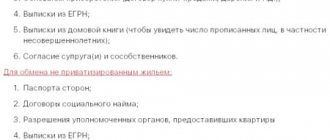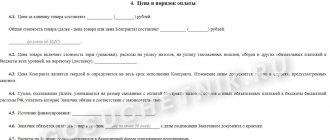Zh. V. Specht author of the article, consultant at Askon
What to do if an error is found in an agreement with a counterparty, how can it be corrected? How do courts interpret errors in contracts?
An agreement is an agreement between two or more persons to establish, change or terminate civil rights and obligations (Clause 1, Article 420 of the Civil Code of the Russian Federation).
Also, an agreement is a document in which making additions, crossing out or correcting words is not encouraged in legal practice, since any incorrect changes can lead to serious consequences for both parties to the agreement. Up to and including recognition of the transaction as invalid or refusal to register the agreement.
For example, real estate lease agreements concluded for a year or more, real estate purchase and sale agreements. According to paragraph 1 of Art. 551, paragraph 2 of Art. 651 Civil Code of the Russian Federation, clause 2, part 2, art. 14 of the Law on State Registration of Real Estate, they are the basis for registering rights to real estate (clause 1 of Article 551, clause 2 of Article 651 of the Civil Code of the Russian Federation, clause 2 of Part 2 of Article 14 of the Law on State Registration of Real Estate). However, if the contract contains such corrections, Rosreestr will return your application for state registration without consideration (Clause 2 of Article 25 of the Law on State Registration of Real Estate).
Error in the contract
It must be borne in mind that in Russian legislation there is no rule that enshrines the concept of “error in the contract.”
An error in the broad sense of the word is understood as an unintentional, accidental deviation from the truth or correct actions or conditions. Thus, it can be assumed that an error in a contract is a deviation of the terms of the contract from the true will of the parties, for the implementation of which such an agreement is concluded.
The following generally recognized types of errors when concluding contracts can be distinguished:
1) Typos.
Some distortion of the meaning of the text or the facts stated in it, for example, the omission of a letter or an extra letter, the omission of a word, its distortion, etc. Also, typos are often found in the name of the subject of the agreement or the parties, in their details, including bank details, in amounts, etc.
2) Actually errors.
Such errors arise due to the inattention or negligence of the parties when drawing up the contract in writing, as well as when distortion of information that was agreed upon by the parties orally. At the same time, it is worth noting that neither party in such situations has the goal of misleading or deceiving the other party.
3) Errors due to misrepresentation or deception.
Errors in this case appear precisely because of deliberate actions that deliberately distort the terms of the agreement, deception or misrepresentation by one party to the contract in relation to the other or third parties. Transactions made under the influence of misconception or deception may be declared invalid by the court (Articles 178 and 179 of the Civil Code of the Russian Federation).
Fix state registry error
There are a lot of such mistakes today. Simple negligence or inattention of specialists from government agencies gives rise to documents with errors. You need to correct it immediately, without leaving the window for issuing documents. If you notice an error right away, you can correct it free of charge by submitting your documents back for correction. If, after a lapse of time, you submit an application for such a correction, practice indicates that the UFSGRKK (or MFC) consider this procedure to be an amendment to the state registration certificate and require payment of a state fee.
Ways to fix errors
- If one or two errors are found in the text of the contract, for example, missing a letter or writing an extra letter, missing a word, an error in a number, or incorrectly spelling a sentence in a paragraph, after it has been concluded, you can do the following.
Cross out the erroneous words, and next to them, on the same sheet, in the free space, write the correct ones, namely: “The corrected one from (indicate the erroneous words or text) to (indicate the correct words or text) believe.” Such correction should be certified by the signatures of persons authorized to amend the agreement, and their full name should be provided. and position, as well as date.
- If a large number of such typos or errors are found in the text of the contract, then the best option for both parties to the transaction is to re-sign the contract or draw up corrections in an additional agreement to it.
You can prepare an additional agreement to present a new version of a clause or paragraph of the agreement, or another part of it, if necessary.
In practice, drawing up an additional agreement turns out to be easier, and agreeing on amendments is faster than re-signing the agreement. Because in many companies, in accordance with internal regulations, the contract must be agreed upon and endorsed by different services before signing by the parties, which takes quite a long time.
Common mistakes in employment contracts
Errors in relation to employment agreements are divided into:
- related to the failure to indicate conditions or information of a mandatory nature in the text of the employment agreement;
- related to the addition of conditions to the contract, the effect of which limits or violates the rights of the citizen being hired;
- having a technical nature.
In the agreement between the employing organization and the employed citizen under Art. 57 of the Labor Code of the Russian Federation must necessarily record the following conditions:
- actual place for carrying out activities (address);
- date for commencement of activity;
- labor characteristics (specialty, positions according to the staffing table, profession);
- compulsory social insurance of an employee, which must be provided by the employer in accordance with the Federal Law of the Russian Federation;
- payment (on the payment procedure) for work (labor) performed, indicating the employee’s tariff rate (salary) according to the staffing table, as well as other stipulated allowances or incentive payments;
- date of issue of earnings.
The specified list of mandatory conditions is not closed. Additions to it can be made on the basis of regulatory documents or by decision of the employer. Newly added conditions must not allow the employee’s situation to worsen in comparison with the provisions of the legislation in force at the time of the additions.
More details
A common mistake is the failure to indicate in the employment contract a reference to the actual place where work is performed or the inaccurate spelling of the name of the position for which the employee is entitled to compensation (benefits).
Conditions regarding the day to begin work, unlike other conditions of a mandatory nature, are not considered unconditionally mandatory. The absence in the text of the contract of a date for the actual start of work is provided for under Art. 61 TK. In this situation, the employee must begin performing his duties on the day following the entry into force of the agreement.
The provision on the procedure for payment for work is often absent, but if present in the employment contract, it is formulated with inaccuracies. Not specified:
- the amount of payments (allowances, compensations) due to the employee, in addition to the basic salary;
- the amount of payment in a currency other than Russian rubles, and the name of the currency used (Article 131 of the Labor Code of the Russian Federation);
- conditions on the periods and place of payment of earnings (Article 136 of the Labor Code of the Russian Federation).
The contract must indicate information about the employer (name of the organization, last name, first name, patronymic of the manager signing the document) and the citizen being hired. Data must be transferred from original documents (charter, power of attorney, passport, insurance certificate). There are cases when the details of the identity document of one of the parties to the agreement are not indicated (number, date and place of issue) or attention is not paid to the validity period of the document.
Important ! Employers who violate the requirements for drawing up employment contracts may be subject to administrative penalties. For example, if contracts do not contain signatures of employees on the employment agreement (Article 61, Article 67 of the Labor Code of the Russian Federation), do not provide for mandatory conditions (Article 57 of the Labor Code of the Russian Federation) or there is no mark on the receipt of the second copy by the employee on the employer’s copy (Article 67 Labor Code of the Russian Federation), a fine of up to 50 thousand rubles may be imposed on the employer. (Article 5 of the Code of Administrative Offenses of the Russian Federation).
How courts interpret errors in contracts
Any typo or technical error that the parties overlooked when entering into a transaction could have adverse consequences for both parties. Which, in turn, sooner or later may lead to a dispute between the parties in court. When resolving civil disputes, the court, in addition to the rules of law, is guided, among other things, by the agreement concluded between the parties, namely its interpretation. Not a single dispute can proceed without interpretation of the contract by the court.
So, according to Art. 431 of the Civil Code of the Russian Federation, when interpreting the terms of a contract, the court takes into account the literal meaning of the words and expressions contained in it. The literal meaning of a contract term, if it is unclear, is established by comparison with other terms and the meaning of the contract as a whole.
If the above rules do not allow determining the content of the contract, the actual common will of the parties must be ascertained, taking into account the purpose of the contract. In this case, all relevant circumstances are taken into account, including negotiations and correspondence preceding the contract, practices established in the mutual relations of the parties, customs, and subsequent behavior of the parties.
Within the meaning of the second paragraph of Article 431 of the Civil Code of the Russian Federation, if the terms of the agreement are unclear and it is impossible to establish the actual common will of the parties in any other way, the interpretation of the terms of the agreement is carried out in favor of the counterparty of the party who prepared the draft agreement or proposed the wording of the corresponding condition. Until proven otherwise, it is assumed that such a party was a person professionally carrying out activities in the relevant field requiring special knowledge (for example, a bank under a loan agreement, a lessor under a leasing agreement, an insurer under an insurance agreement, etc.) (clause 45 Resolution of the Plenum of the Supreme Court of the Russian Federation dated December 25, 2018 N 49 “On some issues of application of the general provisions of the Civil Code of the Russian Federation on the conclusion and interpretation of a contract”, paragraph 11 of the Resolution of the Plenum of the Supreme Arbitration Court of the Russian Federation dated March 14, 2014 N 16 “On freedom of contract and its limits” ).
For example, the Arbitration Court of the Moscow District recognized that the clause of the agreement on granting the option does not allow determining the specific size of the part of the share to be transferred under the purchase and sale agreement, since the wording “in the amount of up to 4.62%” allows for the possibility of any value in the range from 0 to 4.62. In this case, a literal interpretation of the concept “range” leads to the conclusion that the specific meaning is inconsistent, i.e. uncertainty of the essential terms of the contract that can be concluded in pursuance of the agreement on granting the option (Resolution of the Moscow District Court of February 19, 2019 N F05-292/2019 in case N A40-207820/2017).
Errors in the provisions on the possibility of unilateral termination of the contract
The customer has the right to terminate the contract on his own initiative if such a possibility is included in the contract (Part 14, Article 34, Part 9, Article 95 of Law 44-FZ). In this case, it is not necessary to indicate a specific basis for a unilateral refusal, although it is possible, for example, with clarification of the order of interaction between the parties (the position is set out in paragraph 14 of the Review of judicial practice of the Armed Forces of the Russian Federation dated June 28, 2017, and is confirmed by the latest judicial practice, for example, the Resolution of the Arbitration Court Court of the West Siberian District dated April 30, 2021 in case No. A27-1953/2020). In a particular case, the contractor supplied medical equipment (an analyzer for narcotic and potent drugs), but the labeling did not match the data on the registration certificate. It is prohibited to operate such equipment on the territory of the Russian Federation. Accordingly, provided that the contract contained a general right to unilaterally terminate the contract, the customer had all the grounds provided for by civil law, and he quite rightly exercised his right by sending the contractor the appropriate notice.
The presence of unspecified amendments in the contract may lead to adverse consequences
For example, if a dispute arises between the parties, the court may consider that the appropriate changes have not been made to the contract, since the introduction of a handwritten correction not agreed upon by the parties to the contract does not comply with Art. 452 of the Civil Code of the Russian Federation (see, for example, the resolution of the Eighteenth AAS of March 23, 2012 N№18 AP-1838/12). In addition, the agreement presented for the performance of a notarial act must not have erasures or additions, crossed out words or other unspecified corrections, otherwise the notary, as a general rule, does not accept it (Article 45 of the Fundamentals of the Legislation of the Russian Federation on Notaries dated 02/11/1993 No. 4462 -I, hereinafter – Fundamentals of legislation on notaries). In particular, it may not be possible to notarize a copy of the agreement (see clause 1.3 of the Methodological Recommendations for certifying the accuracy of copies of documents and extracts from them, approved by the decision of the FNP Board of April 25, 2016, protocol No. 04/16).
Also, the presence of erasures or additions, crossed out words and other unspecified corrections in documents submitted for state registration of rights to real estate and transactions with it is grounds for returning the application without consideration (Clause 2 of Article 25 of the Federal Law of July 13, 2015 No. 218-FZ).
If the agreement is subject to state registration, or is the basis for the emergence of a right to real estate, difficulties may arise during the state registration of the agreement or the right arising on its basis. It should be noted that in cases where corrections do not prevent an unambiguous interpretation of the contents of the title document, the return of documents on this basis is often recognized by the courts as illegal (see, for example, the resolution of the Ninth AAS dated October 29, 2019 No. 09 AP-45943/19).
Corrected to believe, as correctly written in accounting documentation
Sick leave with errors made is not paid by the Fund. If it is filled in incorrectly, the information must be corrected. The certificate of incapacity for work should not contain:
- capital letters;
- empty cells;
- extra spaces;
- printing on a blank field;
- incorrect name of the employer company.
Errors that are not included in the list of defects that can be corrected cannot be corrected. If they are accepted, a duplicate of the document will have to be drawn up, and the form used will be declared invalid.
Rules for making changes to documents
Incorrect information is crossed out with a thin line, and on the reverse side a note is made, “Corrected to believe.” In the documents, a sample of how to make adjustments should be developed by responsible persons at the enterprise. A correctly carried out procedure preserves the legal status of the document. Changes must be made by the official who originally prepared the documentation. It must bear his signature, certified by a seal.
If errors are made in the section in which the accrual amount is reflected, then the document cannot be adjusted and it loses its legal force. In such a situation, the Social Insurance Fund will have to prepare a separate document that reflects the recalculation of benefits.
What to do if the Federal Tax Service made a mistake
If all the data in the previously submitted registration applications is correct, but in the Unified State Register of Legal Entities they do not correspond to reality, then this is the fault of the tax service. In this case, there is a special regulation that allows you to correct an error in the Unified State Register of Legal Entities (Order of the Ministry of Finance of Russia dated October 30, 2017 N 165n).
To report an error, you must submit a free-form application to the Federal Tax Service, indicating what data should have been entered. The applicant is the director of the LLC.
Application form for correction of errors in the Unified State Register of Legal Entities due to the fault of the Federal Tax Service
After receiving the application, the tax authority must check the error information. If this is true, then the data must be corrected within five working days. After this, the Federal Tax Service sends the applicant a notification confirming the entry of correct information, as well as a new sheet of the Unified State Register of Legal Entities.
How to make corrections
Before making changes to the document, it is necessary to thoroughly study it in order to identify any inaccuracies. Inaccurate information is crossed out with a horizontal line so that the person studying the document has the opportunity to read the previously displayed information that has been corrected. Correct information appears next to incorrect information or on the back of documentation.
Before displaying the current information, it is necessary to make a note “corrected believe”, and after it indicate the date the entry was made and the characteristics of the official who made the adjustment, and put the company seal. When using correctors to remove inaccurate entries, the document can be made irrelevant.
If an error was made in banking or cash documentation, then it is not worth making changes to it, since the only way to solve the problem is to destroy the document and issue a new version. The procedure is carried out by crossing out all information with a long line and writing “Canceled” at the top of the sheet.
When changes are made to the reporting documentation, inaccuracies are crossed out with a long line, and a note is written at the top of the sheet stating that the displayed information is not current. Canceled documents are transferred to the archive for storage and must be preserved for the period of time regulated by legal acts.









